Intellectual Property Insights from Fishman Stewart
Mini Article – Volume 22, Issue 22
Share on Social

Who Owns Your Logo?
Imagine: You invent a new widget. You open your business. You call it “Wicked Widgets” and you hire a graphic designer to create a logo. The logo includes an image of a Grim Reaper holding one of your widgets. And what could be more wicked than that? You obtain a trademark registration for your logo. Then you decide to seek copyright registration for an additional layer of protection. But then, in a wicked plot twist, it turns out you don’t own the copyright to your logo, the graphic designer does! Under US copyright law, in most instances, if an independent designer creates your logo (or other work), then the independent designer, not you as the contracting party, would own the copyright. To obtain ownership, the independent designer must assign the copyright to you and the assignment must occur after the logo is created (copyright title does not vest until after creation), although you should agree beforehand that the copyright will be assigned. On the other hand, if the work was created by an employee within the scope of their employment, then no assignment is needed because the work is considered “made for hire” and the employer would be the copyright owner of the copyright from the outset.
Finny the Fish: When we had Finny created, we employed the services of our esteemed outside artist Ron Borresen. In accordance with our agreement with Ron, he assign to us the Finny illustrations he created. Now, as owner of copyright, we rightfully filed an application for copyright. This application, featuring Finny’s illustrious pose, can be viewed HERE. We will keep you updated on Finny’s adventures through the Copyright Office.
Moral of the Story: If you hire an outside contractor to create a work, most likely you’ll not own the copyright in that work unless you have an assignment. So, if you go with an outside contractor, be sure to contact Kristyn Webb and she’ll guide you along the way.
Kristyn Webb is the Group Leader of Fishman Stewart’s Copyright Practice Group, and is currently earning a Master’s Degree in Copyright Law at King’s College London.

Published November 4, 2022


Related Content from Fishman Stewart
People have long pondered whether or not the Giza pyramids were indeed solely burial chambers, which was the only known, and archaeologically determined, use—until now.
By 1930, efforts began in New York to replace Mother's Day with Parent's Day because men were more than just breadwinners. Those efforts didn't catch on, probably because in that era, women often spent more time in the home.
In February, Nike and Skims announced that they will be working together on a new brand, NikeSkims. The co-brand will create a new line of training apparel, footwear, and accessories specifically designed to meet the unique needs of women athletes.
Generally, federal courts have exclusive jurisdiction over copyright cases, and often, this presents an insurmountable paywall for individual artists and small businesses to vindicate their rights, especially where the value of the individual copyrighted works are relatively low.
Dedicated to raising public awareness about the importance of encouraging innovation and creativity throughout the world, the World Intellectual Property Organization (WIPO) annually observes World Intellectual Property Day on April 26 to showcase the role that patents, trademarks, industrial designs, copyrights and trade secrets play in our everyday lives.
Hold onto your foam fingers, sports fans – college sports just got a whole lot more interesting! The latest updates to Name, Image, and Likeness (NIL) rules are making student-athletes bigger than ever, and it’s not just about the game anymore.
Did a federal court in Louisiana recently decide that US copyrights are global rights? It seems so.
One of his most famous songs, “Lose Yourself” was recently at the center of a lawsuit. In 2019, Eminem’s publishing company Eight Mile Style sued Spotify claiming that Spotify streamed a number of its musical compositions without proper licenses.
One of the most common challenges is whether AI should be free to train on data that is protected by copyright and owned by third parties without first obtaining permission.
The U.S. Copyright Office (USCO) recently published its latest report on AI and “copyrightability.” In short, the USCO considers only some AI-generated works to be sufficiently creative as to deserve copyright protection, and thus, registration.
IDENTIFYING, SECURING AND ADVANCING CREATIVITY®












